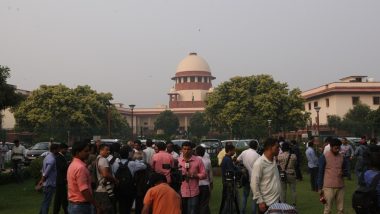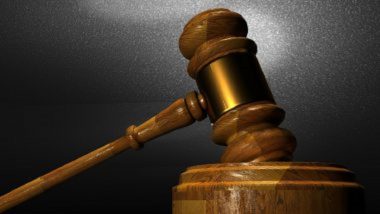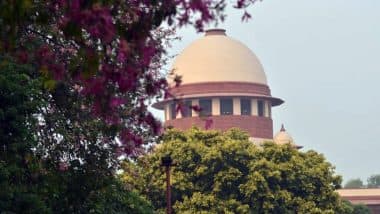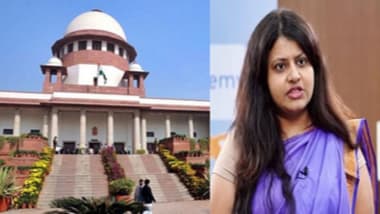New Delhi, November 9: The Supreme Court's five-judge Constitution Bench, headed by Chief Justice of India (CJI) Ranjan Gogoi, issued the verdict in the politically and communally sensitive Ayodhya land dispute case on Saturday. The apex judicial body handed over the possession of the disputed site to the Ram Janmabhoomi Nyas, giving it permission to build a temple at contentious location. A rider has been added by the court, stating that the temple will be built only on the condition of giving the Sunni Central Waqf Board a five-acre alternative land in Ayodhya for building a mosque. Highlights of the Supreme Court Judgement in the Ayodhya Case.
In the nuanced judgement, the apex judicial body has stated that none of the parties have succeeded in explicitly staking claim over the disputed site. The Bench, while noting that the Allahabad High Court was mistaken in dividing the disputed site into three territories, has tasked the central government to form a trust which will takeover possession of the disputed land. The trust would be in-charge of building the temple at the disputed site which has now been handed over to the Ram Janmabhoomi Nyas.
While pronouncing the judgement, the court said that the mosque built in 1527 was not constructed on a vacant land. A structure existed before the Babri Masjid was built, the Bench said, adding that the "structure was not Islamic". The conclusion was derived by the SC from the Archeological Survey of India (ASI) report submitted in 2003.
The top court also noted that the Ram Janmabhoomi cannot be considered as a juristic person, despite Lord Ram being considered as an entity who hold legal rights. The Bench, according to reports, also subsequently underlined that a title case dispute has to be decided on legal principles rather than adhering only to the beliefs.
On the placing of idols inside the mosque in 1949, the Supreme Court noted that it was an act of "desecration". The Bench further held that the mosque was not abandoned. Mere cessation of namaz by Muslims cannot lead to inference that mosque was abandoned and they lost possession, it added.
In 2010, a three-judge bench of the Allahabad High Court equally distributed the 2.77 acres disputed land between Ram Lalla, Nirmohi Akhara and Sunni Waqf Board. The area, on which the central dome of the now-demolished Babri mosque once stood, went to the Hindus. The Constitution Bench started day-to-day proceedings on 14 petitions against the Allahabad High Court verdict on August 6. Babri Masjid-Ram Janmabhoomi Case Verdict: Jamiat Ulema-e-Hind Appeals to Muslims And Hindus to Respect Supreme Court Judgment.
After a marathon 40 days of arguments, the Supreme Court reserved its judgment on October 16. After the conclusion of the hearing, both Hindu and Muslim parties gave their written submission on the moulding of relief in the Ayodhya title dispute case. Muslim parties urged judges to deliver a verdict based on "Constitutional values", seeking restoration of the Babri Masjid as it was before its demolition.
Ram Lalla Virajman, one of the Hindu parties, also submitted a strongly worded note seeking the disputed land for devotees. "The Muslim parties are not entitled to any equitable, more so when the structure is no longer existent. To pray for reconstructing the mosque at the disputed site is inequitable and unjust. It is contrary to Hindu dharma, Islamic law and all principles of justice, equity and good conscience," said the note.
Prior to the day-to-day hearing, the Supreme Court had appointed a mediation panel with former apex court judge FMI Kalifulla as its chief. The mediation panel, which started meetings with both Hindu and Muslim parties on March 8, carried out negotiations for 155 days to develop a consensus. Negotiations, however, failed reportedly because of the hardline stand taken by Jamiat Ulema-e-Hind and VHP-backed Ram Janmabhoomi Nyas.
(The above story first appeared on LatestLY on Nov 09, 2019 11:18 AM IST. For more news and updates on politics, world, sports, entertainment and lifestyle, log on to our website latestly.com).













 Quickly
Quickly




















